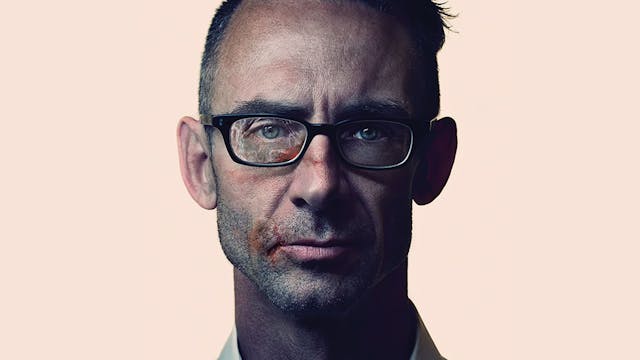
December 14, 2021
Chuck Palahniuk’s ADVICE for Life and CRAZY Stories Will Leave You In Awe | Impact Theory with Tom Bilyeu
- Check out Impact Theory Episode Page & Show Notes
Key Takeaways
- Chuck Palahniuk loves playing with three-dimensional Tetris blocks (stonework)
- That’s when mental breakthroughs happen (e.g. washing the dishes, taking a shower, indulging in stonework)
- You are doing something kind of mindless, but physically and spatially cognitive
- For Chuck, there’s got to be a physical/visceral element present in any kind of storytelling
- Not just people talking in compelling spaces (like it’s the case with “My Dinner with Andre”)
- The elephant mind – mutual consciousness across all human beings (living and dead)
- When you connect with the elephant mind; you have the potential to create something that’s going to resonate with a huge number of people
- “The fear validates that you are doing the thing that means something to you.” – Chuck Palahniuk
- Don’t build your passion on the foundation of trying to impress other people, redeem yourself, or get money
- According to Douglas Coupland, the last significant changes in the brain happen between the ages of 31 and 33 – the small window when people produce their masterpiece
- If you are still doing your passion at that time, this is the time when you are expected to break out
- How does Chuck collect his crazy stories?
- He’s good at paying attention; he just listens and paraphrases what people tell him and ask them follow-up questions
- It also has to do with him being gay; “When you grow up gay, you have to learn everything, you have to watch everything because every innate way that you would do something is wrong.”– Chuck Palahniuk
- The difference between pathos (true tragedy) and bathos is when you go one step too far (deeply sad, but comic)
- Once it reaches bathos there is something comically absurd to it
Key Books Mentioned
- Fight Club by Chuck Palahniuk
- Chuck’s most famous novel thanks to the 1999 film adaptation by David Fincher
- He wrote it while working full-time, and most of it was written while he was at work
Intro
- Chuck Palahniuk (T: @chuckpalahniuk and IG: @chuckpalahniuk) is an American writer, best known as the author of the novel Fight Club which was adapted into a feature film. His work has always been imbued with crazy personal experiences and characters that defy social norms
- This is an in-depth look at Chuck’s creative process, early life development, and crazy life stories that will leave you in awe. What’s interesting about this particular episode is that Tom and Chuck don’t avoid silence nor are those authentic junctions removed in the post-production – something that doesn’t happen too often in mainstream media
- Check out Chuck’s website
- Check Out Chuck’s Short Stories on Substack
- Chuck’s Latest Essay, People, Places and Things
- Host: Tom Bilyeu (@TomBilyeu)
How to Freeze Your Monkey Mind
- Chuck loves playing with three-dimensional Tetris blocks
- He is talking about stonework, it runs in his family
- It’s a very Ukrainian thing; it calms his monkey mind
- This is when his mind enters a state of receptiveness for new ideas
- It is like an obsession; you reach a point of exhaustion, but you keep going
- That’s when mental breakthroughs happen (e.g. washing the dishes, taking a shower, indulging in stonework)
- You are doing something kind of mindless, but physically and spatially cognitive
- For Tom Bilyeu, it’s about journaling, meditation, or taking a shower
- Removing stimulus so the body can relax
- Melding the in-between of the conscious and the subconscious mind
In Pursuit of Creative Ideas
- “No matter how interesting the idea is if it’s “My Dinner with Andre“, I’m not going to sit through it.” – Chuck Palahniuk
- For Chuck, there’s got to be a physical/visceral element present in any kind of storytelling
- Not just people talking in compelling spaces (like it’s the case with “My Dinner with Andre”)
- A lot of his creative work gets done while he’s doing physical labor
- He can only think for so many minutes at a time
- There needs to be an overall task that he is doing as a foundation for making the ideas occur at a slow pace
- The “baby” takes a long time to come out, new ideas won’t come out every 30 seconds
- He might as well fill up his time with something else
- Chuck wrote Fight Club while he was working full-time, and most of it was written while he was at work
- Doing thoughtless work, your mind has to stay occupied with something “…and that’s when the ideas start to come around, on a reasonable rate, I’m not rushing thing.” – Chuck Palahniuk
Why Did the Bishop Slap Chuck? (The Dream Of a Universal Field Theory)
- Elephant mind vs. monkey mind
- Chuck’s writing teacher Tom Spanbauer taught him about the elephant mind
- It is the mutual consciousness across all human beings (living and dead)
- When you connect with the elephant mind; you have the potential to create something that’s going to resonate with a huge number of people
- How to find that “zone”? Illustrated via Chuck’s crazy life story:
- Young Chuck had a very old school bishop who would slap them so hard it would turn their head sideways and taste blood
- The slap is a part of receiving the Sacrament of Confirmation and a sign of full membership to the Christian community
- Similar to the rite of passage ceremonies conferring knighthood (the touch to the shoulders)
- This is also what Dalai Lama did to one of Chuck’s friends- he slapped her across the face
- The meaning is waking up to what it means to be a human being; confronting your mortality
- “I’m always looking for these cross-cultural ideas and gestures and images that can be tied together in a new fresh way.” – Chuck Palahniuk
- Because the slap is a cross-cultural thing, Chuck used it “accidentally” in Fight Club (punching a character in the ear)
- He is looking for these ideas not only as a writer but for making sense out of what looks like chaos (sort of a universal field theory)
How to Make Shame Productive?
- At one of his workshops, Chuck stepped over the line and made one of the students cry
- He was called out and felt enormous shame, but he liked it
- “After you’ve had your period in the shower and all the girls throw tampons at you, you’ve got nowhere to go than up.” – Chuck Palahniuk
- Chuck is referring to the menstruation scene from the Carrie (1976 film)
- We spend a lot of our time resisting being shamed
- It makes us stop feeling like we are at the center of the universe, and puts us back “ground zero”
- The ground zero is like a fresh wake-up; there is freedom. you are not trying to dominate and look good
- When you get to that place, you have two choices: remain the same (unauthentic) or do things differently
- There is an awareness that what you’re doing is a conscious choice, this is how you know you reached ground zero
- “If you build back the same without knowing you’re doing so then you never reached zero.” – Chuck Palahniuk
What Scares You Has Meaning
- Build towards what frightens you or what you are most afraid of failing at
- Why choose the path that can bring you the biggest amount of misery?
- When on your deathbed, you are not going to say “Wow, I’m really glad I did all the easy things.”
- “The fear validates that you are doing the thing that means something to you.” – Chuck Palahniuk
- Don’t build your passion on the foundation of trying to impress other people, redeem yourself, or get money
- If you want to be a writer, do not write for any other reason other than the love of writing
- Do it because it’s the most fun and most frightening thing you do
Genius Is a Young Man’s Game
- Chuck talks about Douglas Coupland’s take on the relationship between aging and creating
- He is a Canadian novelist, best known for his 1991 international bestseller Generation X
- The last significant changes in the brain happen between the ages of 31 and 33 – the small window when people produce their masterpiece
- The point when they can synthesize their experience and their education to produce something larger than the sum of the two
- 33 to 34 is generally when people buy their freedom with their masterpiece
- If you are still doing your passion at that time, this is the time when you are expected to break out
- Genius is a young man’s game
- Tom has a problem with accepting that his best days are behind him
- People who are creative throughout their entire lives fall in love with the discovery process
- For them, it’s not about the single outcome, it’s about the process
- They are going to bloom over and over until they die
Life Influences and Personal Stories
- People, Places, Things: My Human Landmarks – Chuck’s new nonfiction essay
- He wanted to write about an enigmatic man from his childhood
- A retired railroad laborer who gave candy to children and planted enormous gardens in ruined industrial sites
- It gave everyone a glimpse of how beautiful things could be
- The man showed them an aesthetic way of being they never would have discovered for themselves
- Because of his influence, Chuck started looking for other figures like him
- He wanted to synthesize strange local human landmarks stories and demonstrate how they are a part of everyone’s lives
- Once you recognize the people that have influenced you, you want to create that same joy in other people’s lives
- It’s an automatic response of perpetuating a beautiful way of existence for other people
- How does Chuck collect his crazy stories?
- He’s good at paying attention; he just listens and paraphrases what people tell him and ask them follow-up questions
- It also has to do with him being gay; “When you grow up gay, you have to learn everything, you have to watch everything because every innate way that you would do something is wrong.”– Chuck Palahniuk
- He had to pay attention and study all human behavior on a survival level
- Things like how to carry his books, how to walk, etc. everything is about presentation/performance
Everything Is a Performance
- Chuck realized very young that everything is performance because he was hyper-aware of everyone
- This is one of the reasons why gay people become creative
- They recognize the qualities of things and they can replicate them because they have been doing that their whole life
- Struggle and dealing with the struggle is crucial for one’s development
- The tendency to tailor your behavior to fit into the larger culture
- It is interesting to look at how traumatic experiences shape people’s lives
- Being an orphan shows up a lot in hyper-successful people
- Dyslexia in entrepreneurship; is it a brain thing or struggling more to show everyone?
Bathos – Comic Tragedy
- When beginning writers come to his workshop, they always want to write their life’s most traumatic story
- Chuck thinks this is a bad idea because those are the stories that are closest to us
- And if you mess them up, it can unintentionally become a comic tragedy (bathos)
- The difference between pathos (true tragedy) and bathos is when you go one step too far (deeply sad, but comic)
- Once it reaches bathos there is something comically absurd to it



